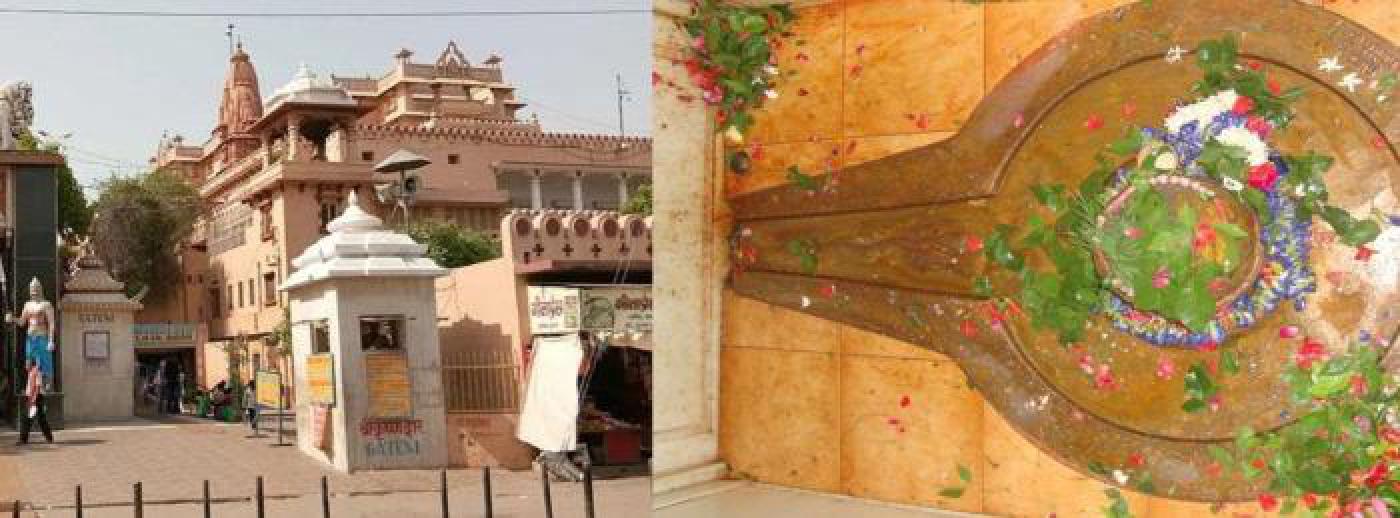One of the most significant religious sites in Varanasi, India, is Mritunjay Mahadev Temple Varanasi. Varanasi also known as Banaras or Kashi is one of the oldest cities in the world and is considered sacred by Hindus. The temple is dedicated to Lord Shiva, especially to his form of Mahamritunjay which means “the conquer of death”.

Mritunjay Mahadev Temple ( Mandir ) In Varanasi
The Shiv Purana states that Mahadev created the “MahaMritunjay Mantra” and that he only revealed the chant's secret to Mata Parvati. Mahamritunjay mantra during Rudra Abhishek and Rudra Yagya has the power to extend life and prevent early or untimely death. In addition, it is supposed to cure acute as well as ongoing illness in those who practice it.
Mritunjay Mahadev Mandir, History
The famous and wonderful Mritunjay Mahadev Mandir is located in Varanasi. For pilgrims, Lord Mahadev - also referred to as Lord Shiva- a sacred destination of devotion. The history of this temple is completely hidden by the “The Shivling” and an ancient well. Mritunjay Mahadev is characterised as “the God who prevails over death”. All believers in this temple are believed to be protected from an unnatural death caused by the shivling. To overcome his unexpected death, worshippers honour Lord Shiva as Mritunjay Mahadev.
Individuals from every corner of India come here to follow the “Mritunjay Path” to get their problems solved. On the grounds of the temple is an historical well, called a koop on rare occasions. The water from the spring offers beneficial properties for human beings. It is believed to mix numerous underground water streams that possess remarkable medicinal properties for an extensive variety of illnesses.
The famous “Dhanvantri”, the father of Ayurveda is believed to have thrown all of his medication into the well, the well’s water is regarded as holy and possesses medicinal properties that can assist in treating an extensive variety of illnesses.

Spiritual Magnificence of Mritunjay Mahadev Temple Varanasi
- It is said that devotees’ difficulties might instantaneously vanish when they visit the Mritunjay Mahadev Temple Varanasi for 40 continuous Mondays and offer Lord Shiv with flowers, milk, and water.
- It is said that repeating the “Mahamritunjay Mantra” in the temple for 1.25 lakhs with the pure soul can prevent and help the devotee with an unexpected death or dying too soon.
- There is also a well-known “Dhanvantri Kua” in the temple premises. It is claimed that all financial problems may disappear if you preserve the water from this well in your house.
- It has been suggested that the use of coconuts in the Pooja has beneficial consequences.
- Putting a coconut over the Shivling helps in achieving all the devotee's wishes. People take the coconut back to their houses once their wishes come true.
- It is additionally believed that writing “om” or “Ram” on 11 Belpatta and then offering it to the idol improves the effectiveness of the Pooja and enables people to achieve their goals more quickly.
Mritunjay Mahadev Varanasi Location
The famous Shiv temple Meitunjay Mahadev Temple is located in Varanasi, Uttar Pradesh, India. The Mritunjay Mahadev Varanasi is popularly known for its historical importance and spiritual significance in Hinduism. It is situated towards the north of Kashi Vishwanath Temple. The temple is located specifically in Varanasi’s Karan Ghanta neighbourhood.
- It is located at 500 meters South-East of Koatwali.
- 1.7 kilometres West of Gola Ghat.
- 1.5 kilometres towards the North of Pancha Ganga Ghat.
How to reach Mritunjay Mahadev Temple
Cars, buses, and trains are only a few convenient ways to get there. Everywhere in the city can be easily visited through the local ways. The region’s constant transport is available including vehicles, taxis, and auto-rickshaws. It has plenty of space to stay, tea shops, fast food restaurants, etc. in the nearby areas for visitors.
Maha Mritunjay Mantra
The Tryambakam mantra also known as the Rudra mantra or Mritunjay Mantra, is a powerful Rigvedic prayer that is dedicated to Lord Shiva. It is frequently performed for Psychological, emotional, and physical wellness for overcoming worries and preventing oneself from an early death because it is been to possess tremendous healing and safeguarding characteristics.
Here is the Maha Mrityunjaya Mantra in Sanskrit with its transliteration and translation:
Sanskrit
ॐ त्र्यम्बकं यजामहे सुगन्धिं पुष्टिवर्धनम्।
उर्वारुकमिव बन्धनान् मृत्योर्मुक्षीय माऽमृतात्॥
Transliteration:
Om Tryambakam Yajamahe Sugandhim Pushtivardhanam
Urvarukamiva Bandhanan Mrityor Mukshiya Maamritat
Translation:
“We concentrate our thoughts on Lord Shiva, the three-eyed one who encourages the pervades everything like a sweet scent May he provide us the nectar of Immortality, releasing us from the chain of death and Physical attachments.
It is claimed that devotees can prevent an unnatural and unexpected death or an early death by chanting “The Maha Mritunjay Mantra” in the temple for 1.25 lakhs with pure soul.
FAQ:
-
What is the history of Mrityunjay Mandir?
Despite the precise year of the temple’s establishment is unclear, it is believed to have been founded several centuries ago. One of the oldest cities in the world, Varanasi, possesses a deep spiritual heritage that includes Mritunjay Mahadev Mandir.
-
Which God is known as Mrityunjay?
Mritunjay is the name of Lord Shiva, the Hindu god. The exact meaning of the name “Mritunjay” is the “conqueror of death” or “victim” of death. Shiva’s status as the deity who can battle death as well as offer is emphasized in this term.
-
What is the meaning of Mrityunjay Mahadev?
The term "Mrityunjay Mahadev" is composed of three Sanskrit words: Mrityunjay, Maha, and Dev.
Here's the breakdown of each component and the overall meaning:
-
Mritunjay:
- Mrityu – This word means “Death”
- Jaya – This word means “victory” and “conquer”
- Together, “Mritunjay” translates to “ the conqueror of death”
-
Maha:
- This word means “great” or “supreme”
-
Dev:
- This word stands for the “god” or “deity”
- In this context, it refers to Lord Shiva, who is often called Mahadev, meaning "the great god."
-
Combined Meaning
